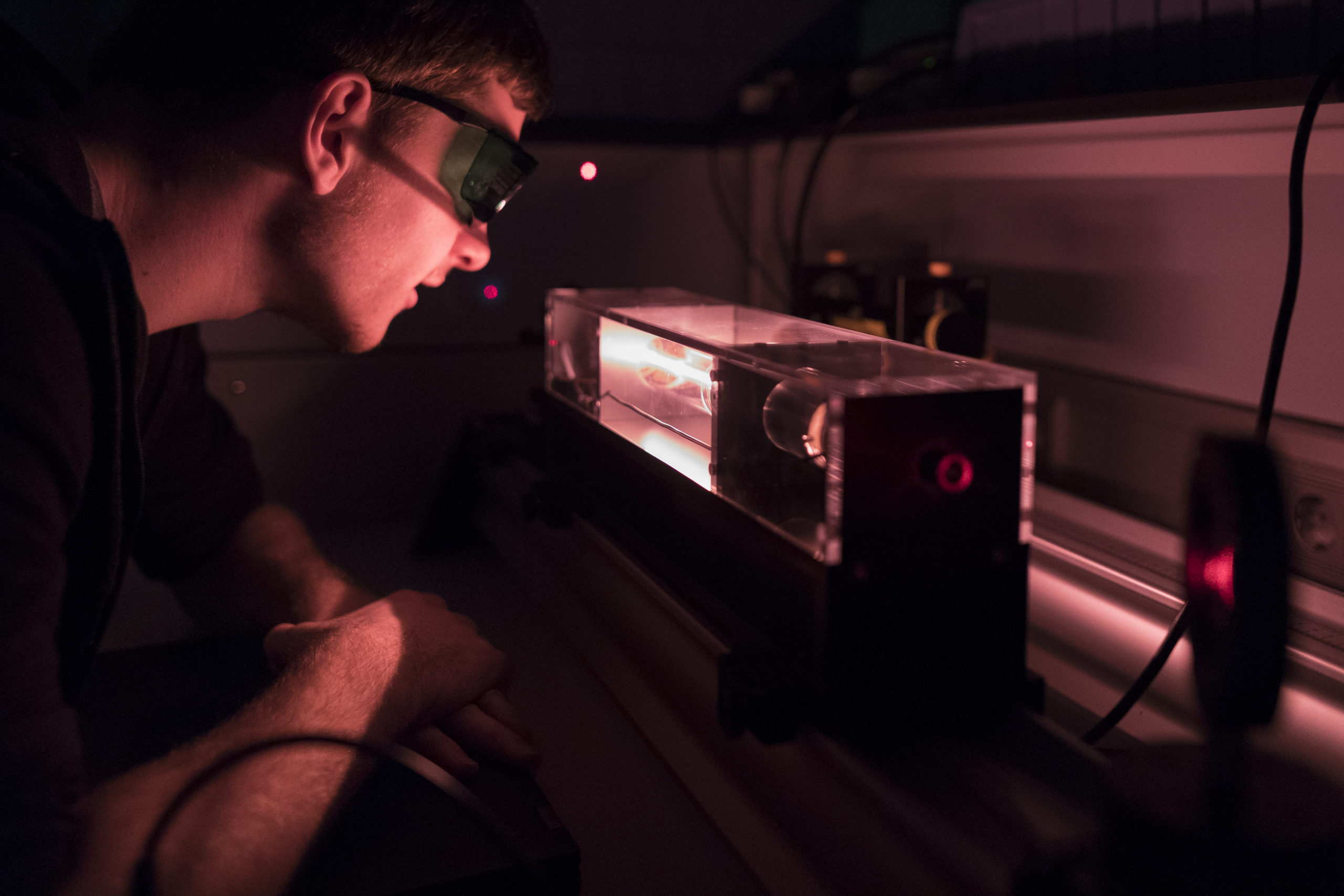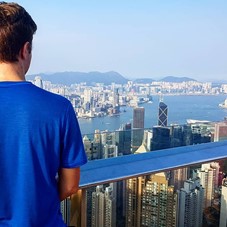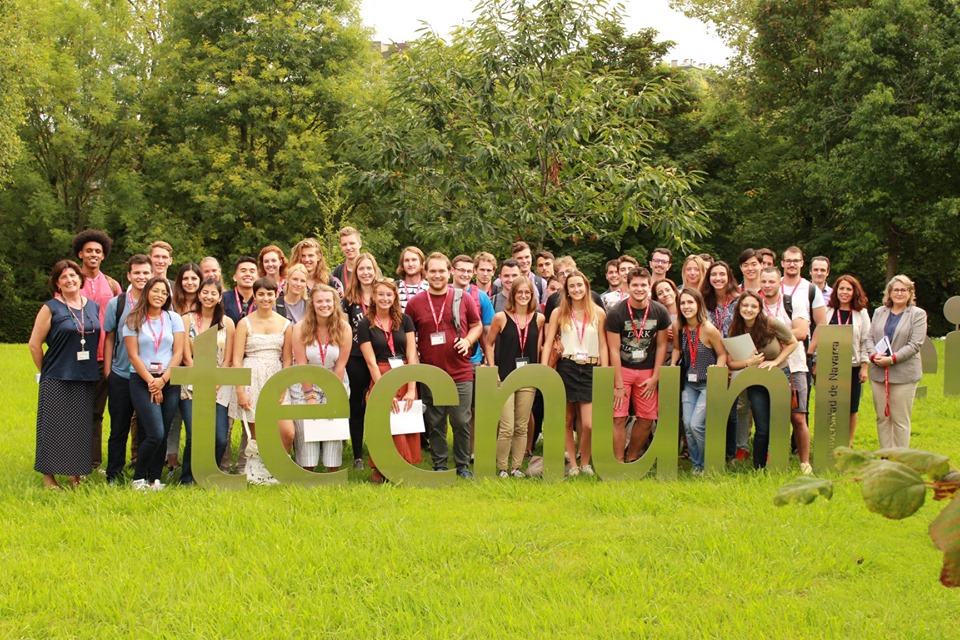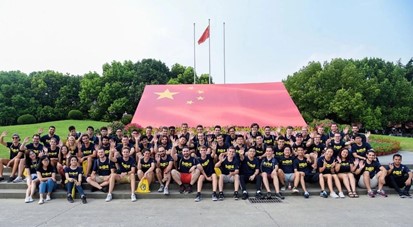fefds
fefds
fefds
fefds
fefds
fefds
fefds







Module 9,10 & 11 (Minor)

The flexible third year of the Bachelor’s in Advanced Technology provides a solid preparation for a wide range of Master’s programmes. You can take your Master’s at the University of Twente, another university in the Netherlands or, like an increasing number of our students, you can opt for a Master’s abroad.
During your third year, you will choose three modules (modules 9, 10 and 11) in line with your ambitions and interests. Educational units can also be taken at other universities, inside or outside the Netherlands. The University of Twente is part of the Erasmus exchange programme for exchange of students within Europe, but also several programmes for studying outside Europe are available. Like with the educational units within the University of Twente this all depends on your personal choice. The only requirement is that the educational units should comply with the programme learning outcomes for a third-year student.
The third year concludes with the Bachelor’s assignment, in which you will prove that you have what it takes to continue your studies at Master’s level. The assignment involves working independently on a research project within one of our research groups, often under the guidance of a PhD student.

Optics
Advanced Technology organizes its own minor module, which includes optics
Studying Abroad
Living and studying abroad can be a very rewarding experience. It is an incredible opportunity to meet other like-minded students in your programme. Also, it enables you to look at yourself, your world, and your studies from a different perspective. You are able to gain invaluable life skills and change and grow as a person. Moreover, study abroad sets you ahead of your peers in terms of your current and future position in our globalizing world.
The University of Twente offers several opportunities for adding an international dimension to your curriculum. At the University of Twente, we believe a stay abroad is a valuable component of the study; therefore stimulating measures like the Twente Mobility Fund (TMF-fund) and the Erasmus-scholarship are available.
When you have decided to go abroad, the next step is to decide what you prefer to do abroad. Keep in mind that it takes 6 to 12 months to make all the necessary arrangements to study in a foreign country; so planning must start as soon as possible.
- Exchange in the context of the Erasmus programme
- Minor
- Bachelor assignment
- International study tour
As an Advanced Technology student you can also apply for an exchange semester/year through the Global E3 consortium. GE3 is a consortium of universities that includes many US institutions. Since a limited number of places is available (2 per year) a selection takes place based on grades and motivation. Please note that in order to take part in an exchange you usually have to provide proof of English proficiency (IELTS, TOEFL, Cambridge).
Experiences Studying abroad
Hi, I am Frederic and I came from Germany to study Advanced Technology at the University of Twente.
In my third year, I had the possibility to do an exchange to Hongkong. I was highly interested in going because it offers a unique study experience in East Asia. As their culture is very different from ours, my intention was to get to know locals and experience their ways of life.
Next to making new friends, what stood out to me was the cuisine and variety of food offered. As I very much enjoy sampling food, it was a super cool time for me to try things like Cantonese steamed buns (Dim Sum), Haianese chicken rice, or hand-made Taiwanese noodles – if you’re more adventurous, you can also find a lot of places that offer intestine soup or even stir-fried pig uterus. 
Outside of the time I spent trying all this amazing food from all over Asia, I tried visiting as much of the region as I could. One of my favorite activities in Hongkong was to hike into the surrounding mountains to get a stunning view of the skyline of the city with the most skyscrapers. Outside of what I imagined to be a very crowded and grey city, there was a surprising amount of nature. As only less than 25% of the land is developed, I was able to take advantage of the many opportunities offered such as observe wildlife, go to the beach, or travel to some of the islands surrounding the city. Even though such little land is developed, Hongkong has 7,5 million inhabitants, many of whom are students. Because there are almost 20 degree-awarding higher education institutions, the student life is vibrant with lots of opportunities to go out.
A venue that I really enjoyed going to was the weekly horse race. It is in the middle of Hongkong Island and has gigantic stands that can hold up to 55,000 people, and free entry for students. So, if you’re looking to blow some money this is the place to be. You can get a pricy beer and bet money on horses that are ultimately going to come dead last because all the actual information on the race is in Cantonese so you chose to invest in the horse with the coolest name – I mean who would have thought that a stallion named Tinker Bell wasn’t going to win. As the horse races end fairly early into the evening, it’s also a good place for pre-drinks before going out. All the nightlife is on Hongkong Island anyway, so you’re already in the area. You can choose between different bars offering craft beer and a ton of clubs playing different genres. Of course, being Hongkong, there are some very noble and expensive establishments but there are also clubs with a good price per liter ratio so if you’re just looking to get plastered that’s definitely possible.
Outside of all these fun activities, the exchange wasn’t only recreation because I was also studying. The course choice was decent which enabled me to combine my pre-master into the exchange by following joyful courses like heat & mass transfer and fluid mechanics. Other than that, I took a course called Artificial Intelligence in Products and some economics courses as they seemed interesting to me. With the knowledge obtained in these courses, I was eligible to get into the master systems & control. I think it was mostly possible through the wide variety of courses offered in Advanced Technology so I could start the pre-master there and compared to AT I also had a bit of an easier time since the workload was lower – also because the exchange was on a pass/fail basis which means no grades were transferred.
Overall, it was a very pleasant time with lots of wonderful experiences. I would recommend going abroad to anyone since it is a rare opportunity to live in a foreign country without many responsibilities. It is also a chance to learn a new way of life, form different routines, and help personal development through all the novel impressions from situations that you could never have imagined before.
My name is Martijn, I am in my fourth year of studying and, currently, I am finishing the last courses of Advanced Technology. In a couple of weeks, I will be starting my master Embedded Systems.
In my third year of the bachelor I studied abroad for about 4 months at TECNUN, the engineering department of the University of Navarra, located in San Sebastián (Spain). I stayed there from around the end of August till the end of December.
The decision to go to TECNUN was firstly based on the fact that I wanted to go to a university in Spain, not located in Catalonia, to learn to speak Spanish better. I chose this specific university mostly because of the amount/types of English subjects the host university offered and because it looked very professional. A lot of students there chose this university just because of the surfing possibilities the town offered, which I ended up appreciating as well.
The courses I took were the following: Prototyping, Fabrication of Electronic Systems, Digital Systems, Production Planning & Scheduling, and, finally, a Spanish course, which resulted in a total of 24 EC. When I was choosing these courses, I was still in the Netherlands, I did not really think about what master I would be doing after my bachelor and I just focused on which courses seemed interesting at the time. It turned out that this helped me quite a lot in choosing the right master program since I ended up deciding on a master with a mix of the things I enjoyed a lot in San Sebastián.
The fact that I studied Advanced Technology helped me understand different views on a certain topic by people from different backgrounds. With the knowledge I had, I was able to bring these views together and to work on projects as efficiently as I would in the Netherlands.
I really enjoyed my time at TECNUN, with the perfect balance between studying and free time. This way, I had a lot of time to explore the country and do a lot of activities, but I also learned some useful things from the courses I followed. A time abroad is one of the few chances you have to be able to live in another country with such ease. On top of that, I got to know a lot of different cultures and I experienced many new things.

Hi! My name is Kazimierz. Last year, thanks to the GE3 exchange program, I had the chance to study for 4 months in the UM-SJTU JI (University of Michigan-Shanghai Jiao Tong University Joint Institute) in Shanghai, China.
I chose this destination due to the high ranking of the university (among the best in China) as well as my interest in the Chinese culture. I was lucky enough to go there with Kevin Voogd, a friend of mine studying Advanced Technology as well. The courses I took, the places I got to see, and the people I met during my exchange made it an incredible experience.
All the classes I took were given in English. I chose to study Solid Mechanics, Strength of Materials, and Fluid Mechanics as my main engineering courses. I also followed Politics of International Economic Relations subject as well as a Chinese language class. I would say that all my courses were on a relatively high level, comparable to UT, with the main difference being the workload. All lectures are mandatory to attend, with graded weekly homework. The way of teaching is more passive, with a lot of lectures and very few projects or labs (I only got some group projects in Politics and two lab sessions in Strength of Materials). All in all, I was very happy with my choice of courses, although I had to put a lot of effort and especially time in order to pass everything.
Even though the workload was high, I had a solid background knowledge for all of my courses. I felt well prepared with Advanced Technology.
As I am currently doing a Master’s in Systems & Control at UT, I started to appreciate more what I have learned during my exchange. In addition to being an occasion to work in a multicultural environment, it allowed me to experience student life from another perspective, tackle problems from a different point of view, and connect with various local or exchange students from all over the world.